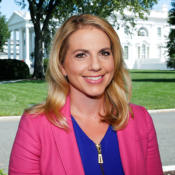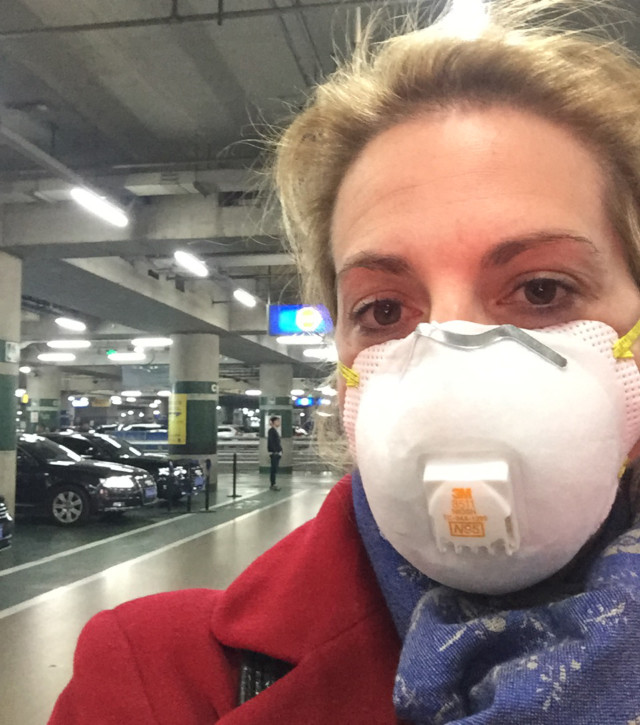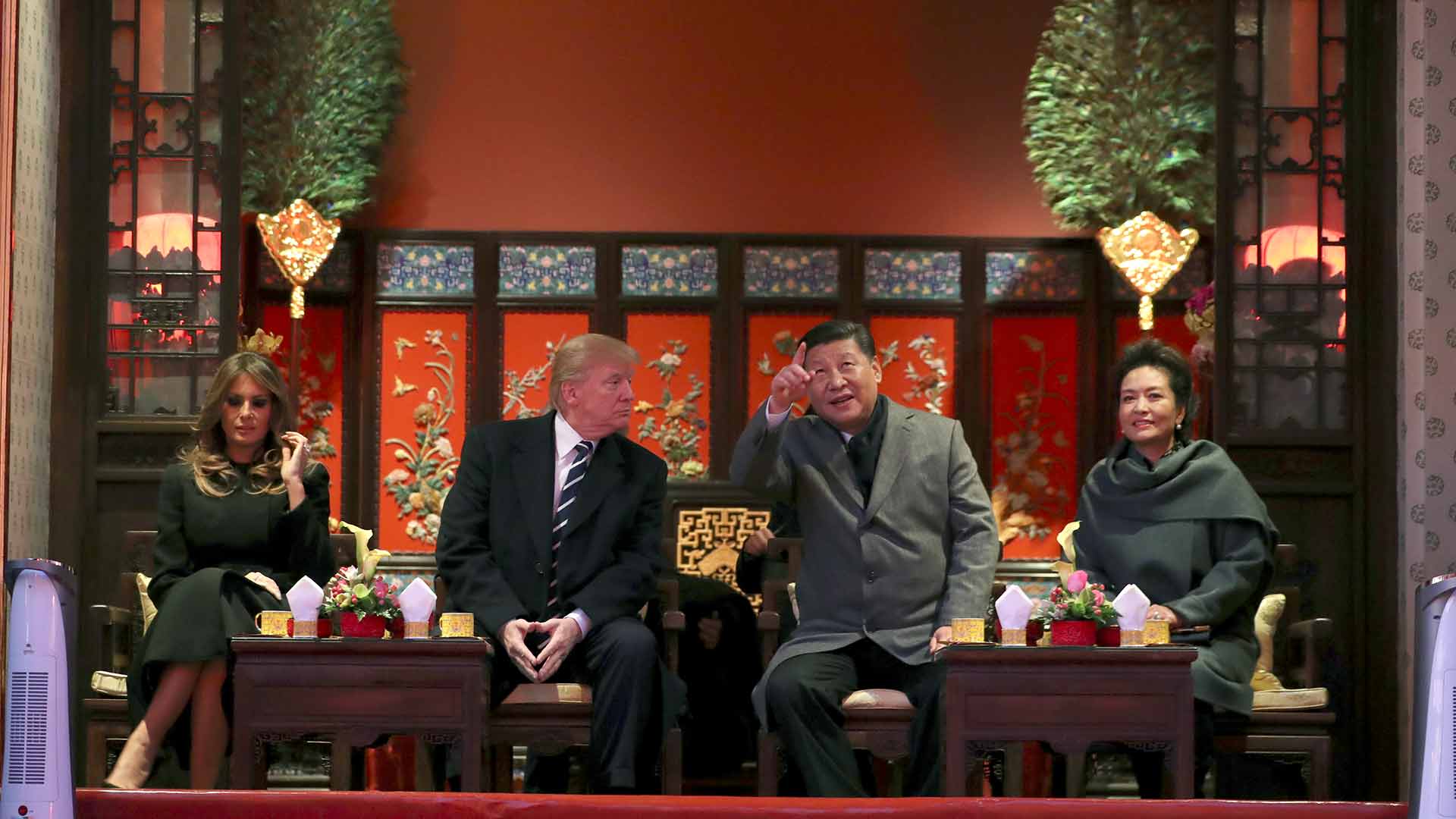Wednesday, November 8, 2017
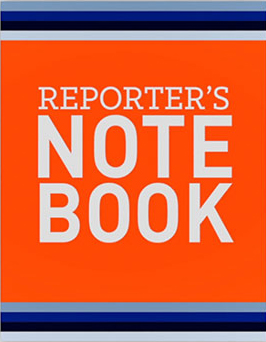
Beijing is buzzing over how U.S. President Donald Trump will interact with Chinese President Xi Jinping.
I was in the CGTN studio as Air Force One touched down in Beijing, watching Trump and First Lady, Melania greeted on the tarmac. Unlike former U.S. President Barack Obama’s 2016 arrival at the G20 summit in Hangzhou, the arrival stairs met Trump’s aircraft in timely fashion.
That – combined with the lack of controversial tweets from the prolific social media president – has Trump’s first state visit off to a good start. In fact, Trump graciously teased his own arrival in Beijing via Twitter:
“Leaving South Korea now heading to China. Looking very much forward to meeting and being with President Xi!”
Leaving South Korea now heading to China. Looking very much forward to meeting and being with President Xi!
— Donald J. Trump (@realDonaldTrump) November 8, 2017
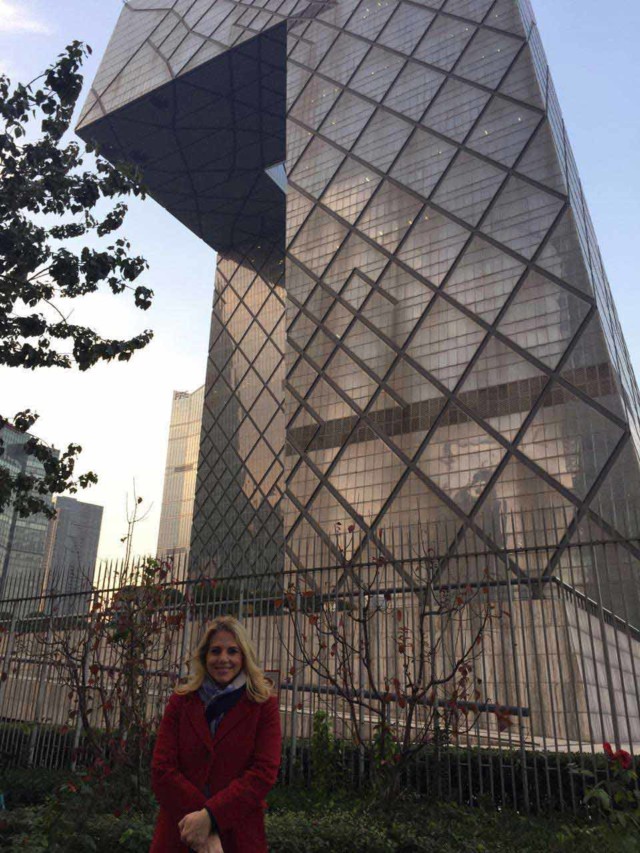
Jessica Stone outside CGTN headquarters.
Chinese officials say this will be a “state visit-plus.”
That means special events that go beyond the standard red carpet treatment for honored guests. And, expect some big business deals and plenty of friendly photo ops.
But Trump being Trump, my colleagues have been wondering if he’ll say or do something unexpected.
Ben Dalton of TV Tokyo recalled that the last time the two leaders met at Mar-A-Lago, the U.S. launched a missile attack against Syria.
Gabi Biesinger of ARD German Radio told me she was curious to see if Trump would bring the fiery tone from his UN speech to the region.
Or if he would change it once he set foot in Asia? The president appeared more restrained. He didn’t call Kim Jong Un “Rocket Man” during his speech in Seoul. And he didn’t threaten to “totally destroy” the place.
But he did call Pyongyang “a hell that no person deserves.”
So did Trump change his tone? “I think he really did,” Biesinger said.
Tuesday, November 7, 2017
Sunshine makes all the difference!
Today dawned bright and beautiful. It’s sunny, breezy and clear.
I am so glad I got to experience Beijing’s beauty. The aspens are all turning yellow and their leaves falling in golden showers around the city. You see piles of leaves in all the main streets. Uniformed people have been sweeping them up with ancient-looking brooms made of tree branches.
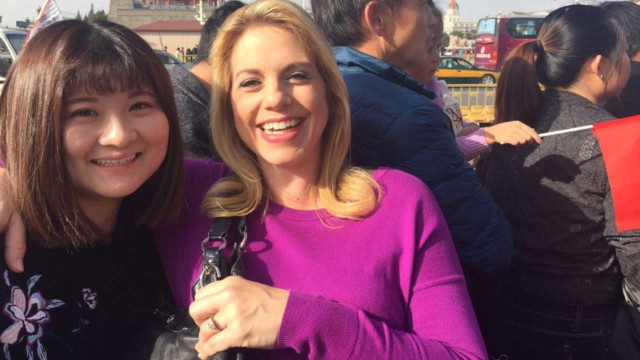
Jessia Stone and producer Diqi Wei in Tiananmen Square, China.
Today, was a flurry of morning live shots and then a race to the Tiananmen Square to film some videos for our digital team.
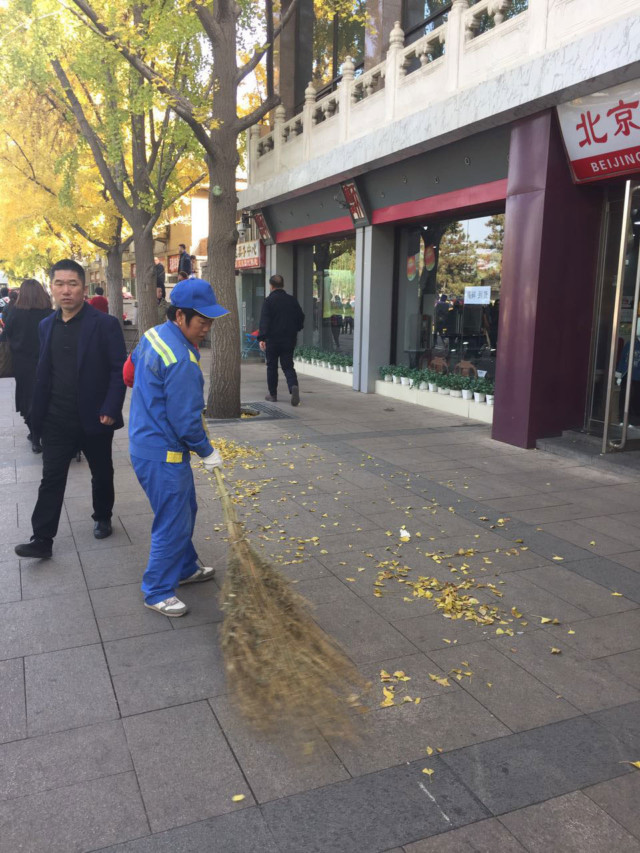
Aspens with golden leaves cover Beijing streets.
It was so incredible to see the Great Hall of the People and the famous picture of Mao above the gate to the Forbidden City.
In the square, there’s a huge bouquet of flowers—decorations from the 19th Party Congress of the Chinese Communist Party.
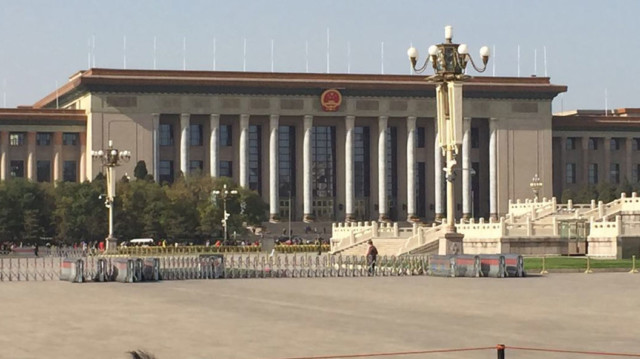
The view from Tiananmen Square, Beijing.
As you might expect in any national capital, security is tight. I see cameras on every light pole, and many police.
There are people everywhere, coming from all over China, Asia and the world. The police seemed to go out of their way for this western face, to smile and be pleasant. It made me feel welcome! Duo Xie! (Thank you very much)
As I walked towards the portrait of Chairman Mao, I realized I was walking in my grandmother’s footsteps.
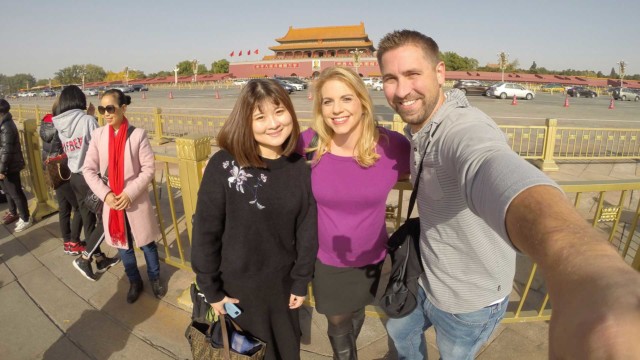
Jessia Stone, photographer Andrew Smith and producer Diqi Wei in Tiananmen Square, China.
She and my grandfather came to China right after it restored relations with the U.S. in the 1970s.
I was too young to remember their trip, but when I was older I saw the photos they took at Great Wall. I recall Grandma Binnie’s China stories — about seeing all the people riding bicycles and doing tai chi along the streets. Grandma is still with us — at 98 years old.
I can’t wait to tell her I’ve made new memories in a place she was so fond of.
One of the funny things about being in a place full of Asian tourists is that our faces stick out.
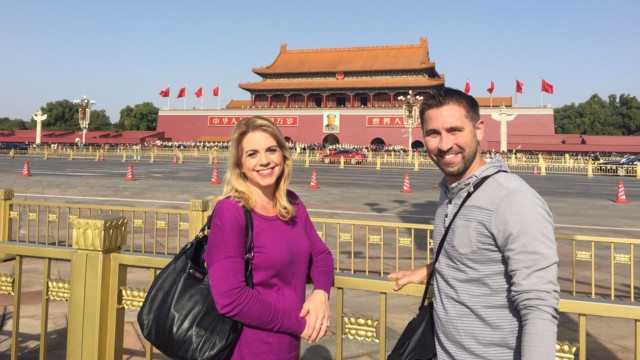
Friendly strangers asked my videographer, Andrew, to pose with them in front of Chairman Mao’s portrait. Then, they asked me to pose. My new “friend” indicated he wanted me to make the “V” sign.
For the Chinese, the “V” sign means “everything is great.” For Americans born after the Vietnam War it means “peace.” Protesters used the flash the “V” sign at rallies to end the war.
As an American, and a reporter for a Chinese network, I couldn’t help but have a serious thought for a moment: “will China and the U.S. be able to achieve peace on the Korean Peninsula?”
We will find out more in the coming days, but first, President Xi Jinping and Madame Peng Liyuan will host a private welcome in the coming hours for President Donald Trump and First Lady Melania—not far from where I’m standing!
Monday, November 6, 2017
RECONNECTING WITH OLD FRIENDS
We drove into Beijing Sunday evening, as dusk mixed with smog formed a dim outline of the city streets.
I wore my air purifying mask and prepared to do so for the rest of the evening. At one point, I even forgot I had it on. I even hit myself in the face with my water bottle when I realized I couldn’t drink through the mask. It’s only for breathing.
Our first assignment when we got to Beijing was to pick up equipment from our Chinese colleagues.
We were lucky to be able to reconnect with our former assignment editor Li Xiang. He’s now the Chief Editor at CGTN in Beijing. He looks exactly the same, and still remains confident, calm, and in control of the situation.
We got our own red carpet welcome thanks to his hospitality — Dumplings!
TECHNOLOGY IS EVERYWHERE:
There’s almost no need for cash. If you have a Wechat (a messaging app similiar to What’s app) you can pay for food, transportation, even your bills.
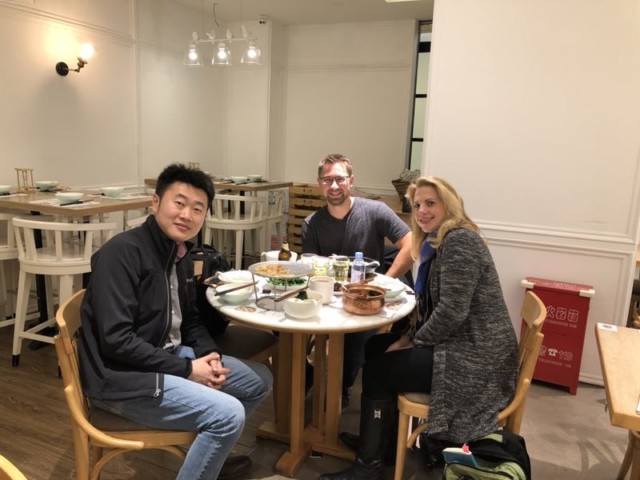
Li Xiang, Andrew Smith, and Jessica Stone.
A regular trip in and out of a parking garage is paid for with an electronic tab on the dash or windshield. It’s similar to an EZpass many drivers in the United States use for paying tolls without having to slow down, but it’s used to get in and out of parking garages in Beijing.
In the business district, there’s little space for street parking, so these devices are a huge time saver.
WALKING IN BEIJING:
As a first-timer to Beijing, one thing is worth the warning — these drivers are like New Yorkers and Cairo drivers all rolled into one. Don’t think that just because you have a right of way to cross a street that it’s safe. I made that mistake on night one, and almost ended up on the hood of a beautiful little red Mini Cooper!
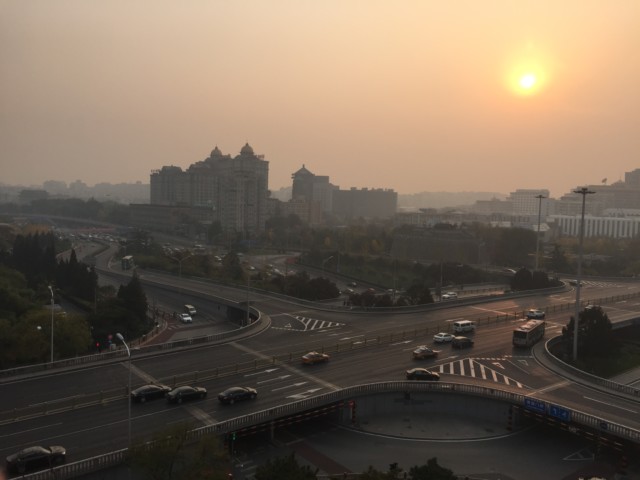
Ahead of President Trump’s arrival, the streets are impeccably clean as are the car parks, but when we arrived on Sunday, there was poor air quality. I was told that the “heating season” begins later in the week, which means air quality will only worsen as winter hits Beijing and more people use coal-powered heat.
Ironically, the smog gives a sort of dream-like quality to all the sights and scenes of Beijing, like an impressionist painting.
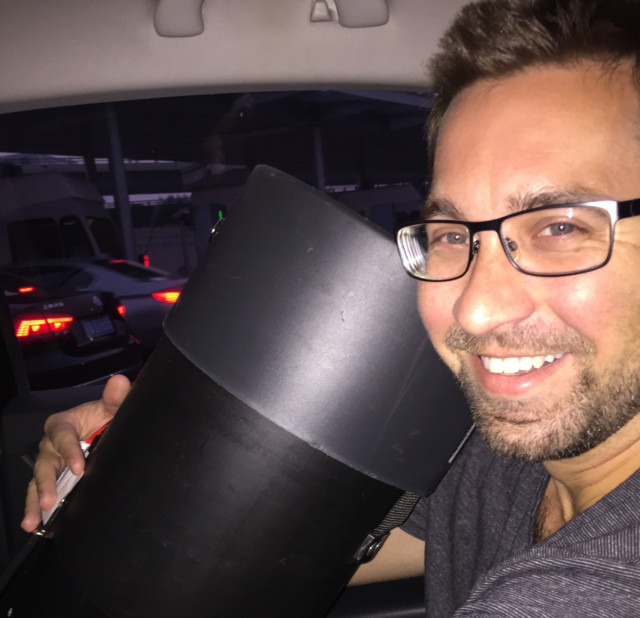
Photographer Andrew Smith.
This actually provided one benefit for our filming — it diffuses the light, making it much more flattering to be in front of the camera.
Nonetheless, I’m still grateful for the masks I brought — and those my colleagues gave me.
There’s still so much more to see and do here this week as the Trump state visit inches closer.
I’ll begin joining you live on China Global Television Network Tuesday night Eastern time.
Friday, November 3, 2017
This will be my third state visit, but the first one in China.
Since covering President Hu Jintao at the White House in 2011, I’ve gotten married, had my first child, and am now pregnant with my second. I’ve learned a lot about China, having worked for China Global Television for the past seven years, but I’ve never been to China. While I have read, dreamed, and written about the place, I will see China with ‘new eyes.’
During the past seven years, China has been rapidly growing and changing. It’s been a great privilege to witness the evolution in U.S.-China relations. I’ve seen China play a bigger role in global governance, and open more lines of communications to the public and the press. At the same time – after the Asia pivot policy under Barack Obama – I’ve been watching how a new White House responds to the rising power of Beijing.
Trump’s White House staff is clearly interested in China, and I’ve been received well. However, there are still factions within the administration who view China as a threat to be contained—especially in trade.
Of course, the Trump presidency presents unique challenges for many of this country’s biggest trading partners, including its two neighbors – Canada and Mexico – and the world’s second largest economy, China. In a multipolar world, the new occupant of the White House has a bilateral approach to diplomacy and trade.
President Trump brings a degree of uncertainty to this visit. His administration has withdrawn from the Trans Pacific Partnership (TPP) and has threatened the DPRK with destruction. The Trump team still hasn’t installed permanent representatives in key diplomatic and defense positions for Asia. And just before the president left for Asia, he changed the advisors coming with him.
Treasury Secretary Steven Mnuchin won’t be coming. National Economic Council chief, Gary Cohn won’t be attending, either. President Trump has asked his daughter and advisor, Ivanka, to stay behind to work on domestic tax reform. The U.S. Trade Representative Robert Lighthizer will be on the trip to participate in trade negotiations. U.S. Commerce Secretary Wilbur Ross will also be leading a trade delegation.
The highest-level official working the DPRK nuclear discussion is U.S. Secretary of State, Rex Tillerson. Last summer, U.S. media reports said Tillerson was on the verge of resigning. Other reports alleged Tillerson called Trump a “moron.” The secretary had to assure the public he has a good working relationship with Trump.
President Xi Jinping and Madam Peng Liyuan will host Trump and First Lady Melania Trump for a state visit. There will be pomp and circumstance, but also private time and intense discussions. On one issue – containing the Democratic People’s Republic of Korea’s nuclear program – the U.S. and China appear increasingly aligned. On another – rebalancing the bilateral trade relationship – the two nations appear far apart.
Trump has heaped both praise and blame on China in both matters, while building a close personal relationship with President Xi Jinping. Trump has repeatedly called Xi a friend, and has credited to that friendship Beijing’s support for UN sanctions against the DRPK. President Xi and other Chinese diplomats have also extolled the benefits of this friendship.
It will be fascinating to see how the U.S. businessman-president, known for “the Art of the Deal,” will negotiate when he’s not on ‘home turf.’ China’s diplomacy has emphasized “mutual respect, mutual benefit.” So, how will Trump’s “America First” policy play out in China’s capital?
Chinese observers might wonder if President Xi will feel emboldened by his 19th Party Congress mandate to drive a harder bargain on trade. And will Xi favor humanitarian aid to DPRK citizens over harsher penalties against Pyongyang? Will we be writing about major breakthroughs? Or the status quo?
I’ll be bringing you a unique blend of U.S. and Chinese perspectives from the White House Press Corps in China.
Jessica Stone is a CGTN Correspondent. Her analysis represents her views alone.
 CGTN America
CGTN America